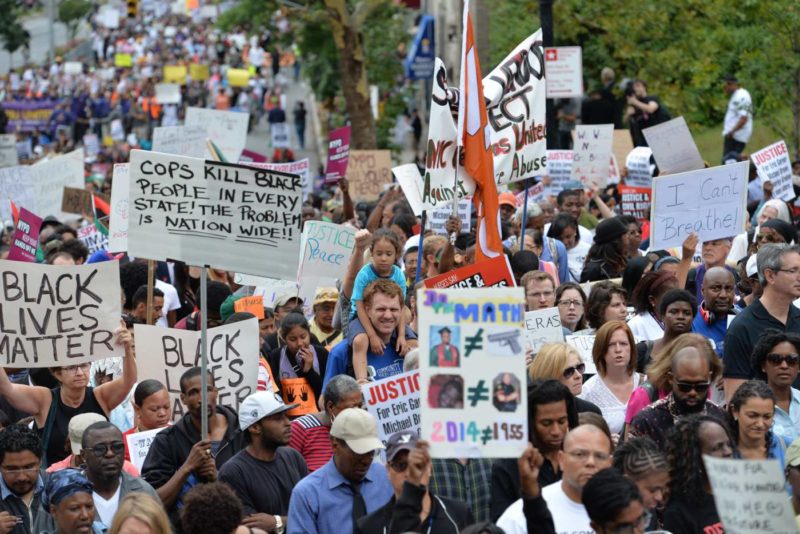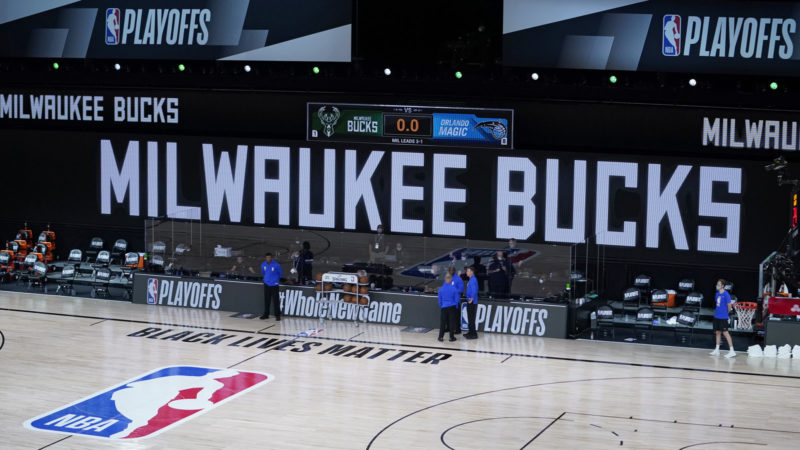Special News Series: Rising Up For Justice! – Milwaukee Bucks Lead Strike In Pro Leagues To Protest Racial Injustice
Share
Explore Our Galleries
Breaking News!
Today's news and culture by Black and other reporters in the Black and mainstream media.
Ways to Support ABHM?
Introduction To This Series:
This post is one installment in an ongoing news series: a “living history” of the current national and international uprising for justice.
Today’s movement descends directly from the many earlier civil rights struggles against repeated injustices and race-based violence, including the killing of unarmed Black people. The posts in this series serve as a timeline of the uprising that began on May 26, 2020, the day after a Minneapolis police officer killed an unarmed Black man, George Floyd, by kneeling on his neck. The viral video of Floyd’s torturous suffocation brought unprecedented national awareness to the ongoing demand to truly make Black Lives Matter in this country.
The posts in this series focus on stories of the particular killings that have spurred the current uprising and on the protests taking place around the USA and across the globe. Sadly, thousands of people have lost their lives to systemic racial, gender, sexuality, judicial, and economic injustice. The few whose names are listed here represent the countless others lost before and since. Likewise, we can report but a few of the countless demonstrations for justice now taking place in our major cities, small towns, and suburbs.

To view the entire series of Rising Up for Justice! posts, insert “rising up” in the search bar above.
Milwaukee Bucks Lead Strike In Pro Leagues To Protest Racial Injustice
‘Tired Of The Killings’: Pro Athletes Refuse To Play To Protest Racial Injustice
By Tom Goldman, NPR
August 26, 2020

Professional sports teams in several leagues have taken their most dramatic steps yet in an effort to raise awareness about social justice issues.
On Wednesday, the NBA’s Milwaukee Bucks decided not to play their playoff game against the Orlando Magic to protest Sunday’s police shooting of Jacob Blake, a Black man in Wisconsin. Following the Bucks’ decision, the NBA announced all three playoff games scheduled for Wednesday were postponed.
According to the league, those three games, including the Houston Rockets vs. Oklahoma City Thunder and Los Angeles Lakers vs. Portland Trailblazers, will be rescheduled.
After the NBA’s announcement, the dominoes started to fall.
In Major League Baseball, three games were postponed. Another Wisconsin team led the way — the Milwaukee Brewers called off their home game against the Cincinnati Reds.
“We need to pause and reflect on the events that are causing such pain and hardship to our local community and country,” the Brewers said in a statement. “The entire organization is committed to putting the spotlight on racial injustice, inequality, and the necessity for change.”
The Seattle Mariners, a team reportedly with the most black players in the majors, decided not to play San Diego on Wednesday, saying the team stands “with our players as they speak out with their words and actions against social injustice.”
The Los Angeles Dodgers and San Francisco Giants also postponed their game.
The WNBA postponed its three-game schedule Wednesday night. Major League Soccer called off five games.
Tired and demanding change
It all started with the Bucks. The top team in the Eastern Conference was scheduled to play Orlando in Game 5 of their first-round playoff series. The Bucks lead 3-1. Orlando took the court to warm up, but the Bucks didn’t. Soon it became apparent the Milwaukee players weren’t going to come out. The basketballs were put away. The referees left the court.
Guard George Hill told Marc Spears of ESPN’s The Undefeated, the Bucks weren’t playing in light of the shooting of Jacob Blake on Sunday. Blake survived, but his family says he was paralyzed after being repeatedly shot in the back while trying to climb into the driver’s side of a vehicle.
“We’re tired of the killings and the injustice,” Hill said.
The NBA’s most prominent player, LeBron James, was scheduled to play Wednesday with his Los Angeles Lakers hoping to clinch their first-round series against Portland.
James, with 47 million Twitter followers, spoke for many athletes when he tweeted an expletive, and then this: “WE DEMAND CHANGE. SICK OF IT.”
The day after Blake was shot by police, the Bucks’ Hill echoed another growing sentiment felt by some players — frustration about living in the NBA’s pandemic-protected environment, referred to as the bubble, near Orlando, Fla.
“We can’t do anything,” Hill said in an interview. “First of all, we shouldn’t even came to this damn place, to be honest. I think coming here just took all the focal points off of what the issues are.”
That was a concern of some players before they arrived in Florida in early July. Those who’d taken part in nationwide demonstrations against police violence and social inequality following the death of George Floyd, or who’d spoken out on those issues, felt the strength of their messages might be lost as games started and connections to the outside world shrank.
In the aftermath of Blake’s shooting, the frustration grew.
The bubble has been filled with reminders of social injustice — Black Lives Matter is written on the basketball courts. Most players and coaches are kneeling in protest during the playing of the national anthem and are wearing jerseys and shirts with messages like I Am A Man, Education and How Many More?
Toronto Raptors guard Norman Powell was one of those questioning these well-intentioned displays.
“Taking a knee for the anthem, that’s not getting the job done,” Powell said. “That’s getting washed out. Something has to happen where you’re forcing these people who can make the change to do something.”
The Bucks followed their decision with a statement aimed at forcing that change.
Hill and teammate Sterling Brown read it to reporters.
“The past four months have shed a light on the ongoing racial injustices facing our African American communities. Citizens around the country have used their voices and platforms to speak out against these wrongdoings. Over the last few days, in our home state of Wisconsin, we’ve seen the horrendous video of Jacob Blake being shot in the back seven times by a police officer in Kenosha and the additional shooting of protesters. Despite the overwhelming plea for change, there has been no action, so our focus today cannot be on basketball.
Read the full article here.









Comments Are Welcome
Note: We moderate submissions in order to create a space for meaningful dialogue, a space where museum visitors – adults and youth –– can exchange informed, thoughtful, and relevant comments that add value to our exhibits.
Racial slurs, personal attacks, obscenity, profanity, and SHOUTING do not meet the above standard. Such comments are posted in the exhibit Hateful Speech. Commercial promotions, impersonations, and incoherent comments likewise fail to meet our goals, so will not be posted. Submissions longer than 120 words will be shortened.
See our full Comments Policy here.